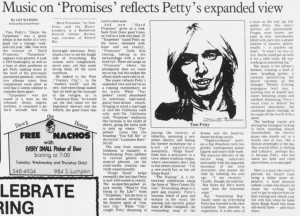Music on 'Promises' reflects Petty's expanded view
By Jay Watson
The Red & Black - June 2, 1981
"Hard Promises," by Tom Petty and the Heartbreakers, is a Backstreet Records release. Review copy courtesy of Record Bar.
Tom Petty's "Damn the Torpedoes" was a great album in the midst of a very good (for a change) rock-and-roll year, 1980. Now with the release of "Hard Promises," "Torpedoes" appears even greater. It took a 1979 bankruptcy as well as a host of other problems to get Petty making music at the level of his previously unrealized potential. And his two albums since then complement each other so well that it seems sublime to consider them apart.
"Torpedoes" was the sound of a man on the rebound: dense, urgent, reckless, it contained a go-for-it attitude that was downright infectious. Petty found a way to see the bright side of everything. His woman were complicated, never easy, yet that made loving them all the more wondrous.
He looked to the West ("Century City"), to the "modern world" and the new. And when things looked bad, he held up the example of the refugee, or, in "Lousiana Rain," he waited out the bad times for the baptismal showers and the rebirth, the good times that had to come soon.
And now "Hard Promises" gives us a look back from those good times as well as a look into them. If "Torpedoes" found Petty on the move, obsessed with hope and not reality, "Promises" finds him resting, taking in his surroundings with a practiced eye. There are songs on "Promises" where the protagonist does not come out on top, but this makes the album much more real to us.
The music reflects Petty's expanded view and serves as a running commentary on his lyrics. While "Torpedoes" rarely abandoned its ambitious, high-toned, guitar-bass-drums attack, bringing to mind a martriage of mid-'60s California rock with mid-'70s California rock. "Promises" embraces this formula in the midst of others, going the extra mile to pick up where "Torpedoes" tunes like the brooding "You Tell Me" or the lyrical "Lousiana Rain" left off.
The step from innocent freshness to maturity is breathtaking. Petty dabbles, in various genres and musical phrases, yet his multi-media creation succeeds unquestionably.
"Kings Road" helps exemplify the fact that Petty is now well-rooted in reality. The no-punches-pulled attack recalls "What're You Doing in My Life?" from "Torpedoes," but the lyric is an out-and-out reversal of the frontier spirit of "Century City." While "City" caught Petty dreaming of joining the security of suburbia, assuming a new urban identity and fleeing his former misfortune for a kind of egalitarian anonymity, "Kings Road" finds him a newcomer in a town where tradition reigns, where newcomers don't slip in but rather stand out: "I'm a new-world boy on the old Kings Road."
"The Waiting" is a bittersweet celebration along the lines of "Here Comes My Girl." Everything about it is pure pop majesty: Petty's luscious blend of pain and ecstasy in the vocal, the soaring the succint guitar lines of Mike Campbell, the resounding snap of the drums and the heart-in-throat backing vocals.
"Nightwatchman" marries a big drumbeat with two prickly contrapuntal guitar figures and more slide work. The staccato delivery of the entire song contrasts noticeably with the apparent boredom of the title character, who passes the time by inflating his own ego: "I am security." Finally, though, he realizes: "But listen my life's worth more than the minimum wage."
But "Something Big" finally sums up everything Petty has learned in the slow transition from naivete to experience. It is the story of a man on the way up, but unlike Petty, this man's motives are questionable. People, even lovers, are tools to him, instruments fitted with care into a grand scheme of success, power, wealth -- it matters not what: "It wasn't no way to live. But he could put up with it for a little while. He was working on something big."
The music is the album's darkest, creating a kind of slow, brooding power, a turmoil paralleling the moral vacuum of the stranger. Throaty 12-string arpeggios lead into a swirling mix of muted tone colors featuring organ and subdued drumming. Petty's vocal tried to deliver the narrative detachedly, but contempt shows through as he snaps off thr words with a sneer.
The backing vocals are jeering but strangely lacking in force, sounding almost disembodied; the electric piano solo stands out in a murky sort of way, like a distant streetlight in the fog. The overall effect is chilling and cathartic; perhaps this is because Petty, who has taken his licks and risen above them, is so outraged.
Here is a man who sued to prevent his record from being a dollar more expensive, a hard promise indeed, a man who knows all about the waiting. And you've got to admire him for that waiting and clench your fist with him when he looks down Kings Road into those old-world faces -- and stays there.

